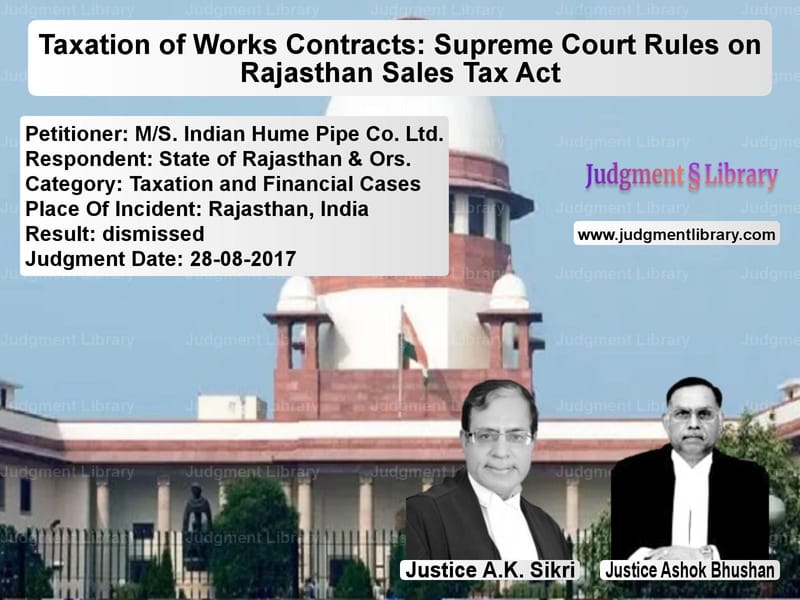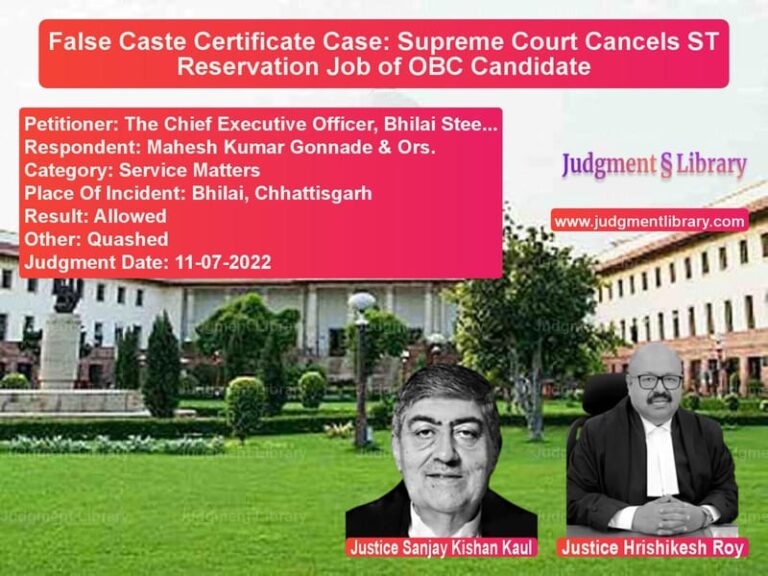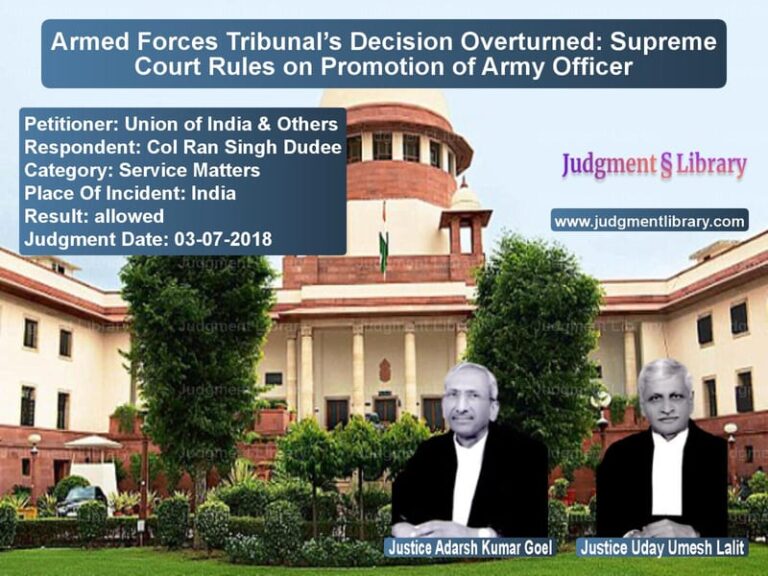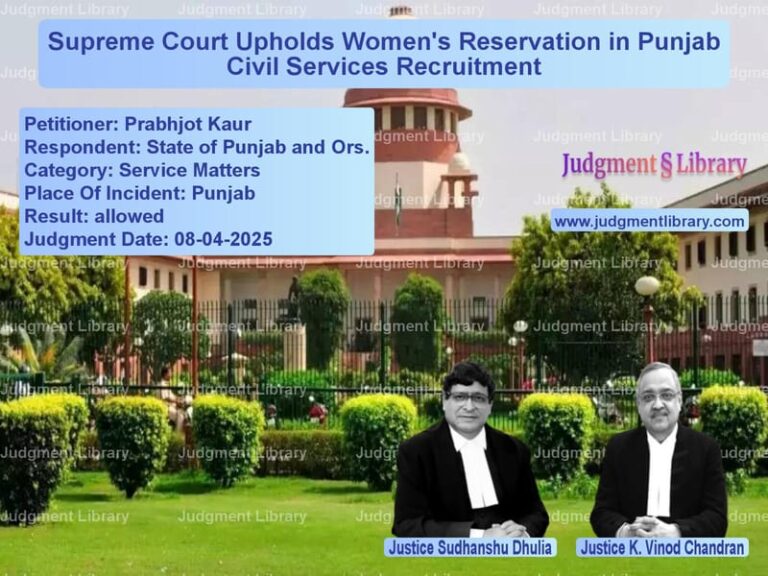Taxation of Works Contracts: Supreme Court Rules on Rajasthan Sales Tax Act
The case of M/S. Indian Hume Pipe Co. Ltd. vs. State of Rajasthan is a landmark Supreme Court judgment concerning the taxation of works contracts under the Rajasthan Sales Tax Act, 1954. The dispute centered on whether the contracts executed by the appellant, which involved manufacturing and laying pipelines for water supply, could be treated as indivisible works contracts or whether they should be taxed as divisible contracts with separate components of goods and services.
The Supreme Court, in its ruling, upheld the decision of the Rajasthan High Court, confirming that the works contracts in question were divisible and that a portion of the contract value was liable for taxation as a sale of goods. The judgment clarified key aspects of taxation laws related to works contracts and reinforced the principles governing the classification of transactions for sales tax purposes.
Background of the Case
The appellant, M/S Indian Hume Pipe Co. Ltd. (hereinafter referred to as the ‘assessee’), was engaged in the manufacturing and laying of pipelines as part of water supply projects for the Public Health and Engineering Department (PHED) of the State of Rajasthan. Several work orders were issued to the assessee for providing and installing pipes, including jointing materials, valves, and related civil works.
The controversy arose when the Rajasthan Commercial Tax Department imposed sales tax on 75% of the contract value, treating it as the sale of goods, while categorizing the remaining 25% as a service component. The appellant contended that the entire contract was an indivisible works contract and should be exempt from sales tax under the relevant tax exemptions.
Key Legal Issues
- Whether the works contracts awarded to the assessee were divisible in nature, allowing for the taxation of goods separately from services.
- Whether the tax imposition under Section 7AA of the Rajasthan Sales Tax Act was legally justifiable.
- Whether the contracts executed prior to the 2001 tax exemption notification were subject to sales tax.
- Whether the contracts should be classified as indivisible works contracts based on legal precedents.
Arguments by the Petitioner (Indian Hume Pipe Co. Ltd.)
The petitioner, represented by senior advocate Arvind P. Datar, raised the following arguments:
- The contracts awarded for manufacturing, supplying, and installing pipelines were composite works contracts, and they should not be divided into separate contracts for taxation purposes.
- According to the decision in Kone Elevator India Pvt. Ltd. v. State of Tamil Nadu, a single composite contract that includes goods, labor, and services should be treated as a works contract rather than as a sale of goods.
- Since the State of Rajasthan had issued a tax exemption notification for works contracts in 2001, the contracts executed before this date should also qualify for the same exemption.
- The majority of the contract value was for on-site work, including civil construction and installation, and should not be considered a sale of goods.
Arguments by the Respondent (State of Rajasthan)
The respondent, represented by Additional Solicitor General Tushar Mehta, made the following counterarguments:
- The contracts in question involved two distinct elements: the supply of pre-stressed cement concrete (PSC) pipes and the associated civil work for their installation.
- The supply of manufactured pipes constituted a sale of goods and was, therefore, liable for sales tax under the Rajasthan Sales Tax Act.
- The works contract classification applied only after the 2001 exemption notification. The contracts executed before that date were subject to sales tax under Section 7AA.
- The assessing authority had carefully examined the nature of the contract and determined that 75% of the contract value was for the sale of goods.
Supreme Court’s Judgment
The Supreme Court, in a judgment delivered by Justice A.K. Sikri and Justice Ashok Bhushan, upheld the findings of the Rajasthan High Court and ruled in favor of the State of Rajasthan.
1. Works Contracts Can Be Divisible
The Court held that the contracts executed by the assessee were divisible in nature and that the supply of PSC pipes was a separate transaction from the installation work:
“When a works contract involves distinct components of supply and installation, the taxable value of goods can be separately determined. The dominant intention test is no longer applicable after the 46th Constitutional Amendment.”
2. Applicability of Taxation Before 2001
The Court ruled that the tax exemption granted in 2001 could not be applied retrospectively to contracts executed before that date:
“The 2001 notification granting exemption to works contracts applies prospectively. The contracts executed before this period remain taxable under the existing legal framework.”
3. Distinction Between Sale of Goods and Services
The Court clarified that even within a works contract, the transfer of goods could be taxed separately:
“It is well established that the transfer of property in goods in the execution of a works contract is deemed to be a sale under Article 366(29A) of the Constitution.”
4. Tax Assessment and Legal Precedents
The Court rejected the assessee’s reliance on the Kone Elevator case, stating that it was inapplicable to the facts of this case:
“Kone Elevator dealt with composite contracts that were not inherently divisible. In the present case, the supply of PSC pipes and installation works are distinctly separable.”
Key Takeaways from the Judgment
- Works contracts can be taxed separately for goods and services if the supply of goods is a distinct and identifiable transaction.
- Tax exemptions must be applied prospectively and cannot be claimed for contracts executed before the notification date.
- The 46th Constitutional Amendment allows taxation of goods even within works contracts, reinforcing the principles laid down in prior judgments.
- The Supreme Court’s ruling affirms the legality of sales tax on divisible works contracts in cases where goods and services can be distinctly separated.
Impact of the Judgment
This ruling has significant implications for contractors and companies engaged in public infrastructure projects. It reinforces that:
- State tax authorities can impose sales tax on the value of goods supplied under a works contract.
- Companies cannot claim retrospective tax exemptions based on later policy changes.
- Contractors must carefully structure agreements to distinguish between supply and service components.
Conclusion
The Supreme Court’s ruling in M/S. Indian Hume Pipe Co. Ltd. vs. State of Rajasthan provides crucial clarity on taxation laws governing works contracts. By upholding the divisible nature of the contracts, the judgment ensures compliance with tax laws while maintaining transparency in public infrastructure projects.
The ruling underscores the importance of adhering to tax regulations and highlights the necessity for companies to structure contracts appropriately to avoid unexpected tax liabilities.
Don’t miss out on the full details! Download the complete judgment in PDF format below and gain valuable insights instantly!
Download Judgment: MS. Indian Hume Pip vs State of Rajasthan & Supreme Court of India Judgment Dated 28-08-2017.pdf
Direct Downlaod Judgment: Direct downlaod this Judgment
See all petitions in Income Tax Disputes
See all petitions in GST Law
See all petitions in Tax Refund Disputes
See all petitions in Judgment by A.K. Sikri
See all petitions in Judgment by Ashok Bhushan
See all petitions in dismissed
See all petitions in supreme court of India judgments August 2017
See all petitions in 2017 judgments
See all posts in Taxation and Financial Cases Category
See all allowed petitions in Taxation and Financial Cases Category
See all Dismissed petitions in Taxation and Financial Cases Category
See all partially allowed petitions in Taxation and Financial Cases Category







